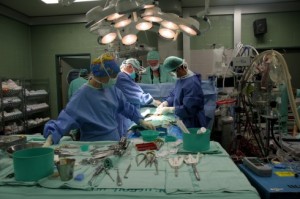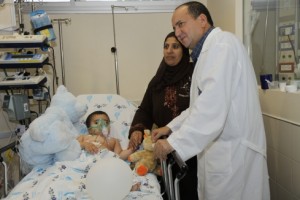
The two doctors move to the side of the pediatric ICU at the Wolfson Hospital in Holon and speak in hushed tones.
“I looked at the smear and it is definitely sickle cell anemia,” Amir Lotan, a hematologist, tells his colleague Tzion Houri.
“We’ll have to treat that first before we can do the surgery,” Dr. Houri, an expert in internal medicine, says with a sigh. “We’ll have to do a blood exchange and try to get it under control.”
Sickle cell anemia is a genetic disease which causes red blood cells to form an abnormal crescent shape. These blood cells deliver less oxygen to the body’s organs, which can complicate the heart surgery that the baby has come to Israel to undergo.
From Africa
Houri looks toward the mother who hasn’t understood a word of the exchange in Hebrew. Palmira Sebastian, 32, is from Angola and arrived with her nine-month-old son Juliom just a few days earlier for heart surgery sponsored by Save a Child’s Heart (SACH). Dressed in a colorful print dress, she sits quietly by her baby’s hospital bed. Wrapped in a blue and white hospital sheet like a cocoon, Juliom sleeps deeply.
“The doctors found the heart problem as soon as he was born,” she tells The Report. “I’m happy that he will get better here and I just want him to be healthy.”

From Gaza
In the next bed is four-month-old Farah Mershed from Gaza. Farah is awake and smiling, her dark brown eyes fringed by strikingly long lashes. At the end of her bed floats a blown-up surgical glove decorated with a drawing, and a stack of diapers. Her mother, Hulud, 28, dressed in a purple hijab, smiles. She has been in the hospital for almost two months straight, never leaving her daughter’s side. Houri says that in addition to the heart defect, Farah had a hernia which was also successfully operated on. In the next day or two she will go home to Gaza.
“This is my first time in Israel and at first I was very nervous,” she says. “I don’t know Hebrew, but everyone here has been so nice, and I am so happy that they helped my daughter,” she says.
Farah is taking Viagra to counteract pulmonary hypertension and several other expensive medicines that SACH will continue to provide.
Houri says both of these babies would have died without the operations performed by SACH, a hospital-based charity that finances heart surgery for more than 200 children each year from the developing world. Funded by donations and the Israeli government, the children are brought to Israel, often with their parents, for a stay that usually averages between two and three months.
When they are not in the hospital, the children and their caretakers live in Legacy House, a building completed in April a few minutes away in Holon. They spend most of their time in a well-equipped playroom or in the garden outside. Each caretaker cooks for her own children, although the ingredients are supplied by the house.
How much does all of this cost each patient? Nothing.
“It’s like Club Med here – everything is included,” Houri says with a grin. “The surgery, the hospital stay, the plane tickets, the follow-up care – we provide it all.”
“The only color skin we don’t like is blue,” says Houri, “because that means the child is not getting enough oxygen.”
For the full story click here –> The Jerusalem Report








